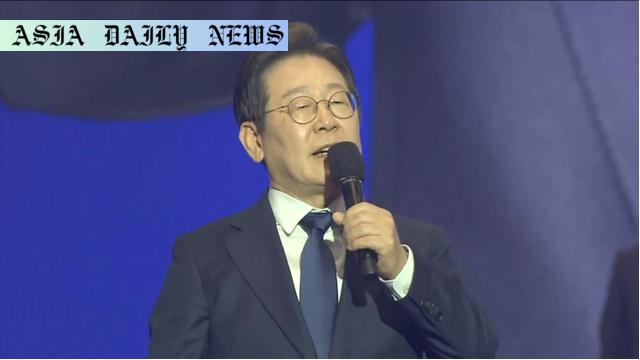Presidential Trial: South Korea’s main opposition candidate faces a critical hearing shortly after the June presidential election.
- High court sets Lee Jae-myung’s trial hearing for June 18, post-election.
- Supreme Court annulled the earlier acquittal, affecting his candidacy.
- Observers anticipate legal decisions shaping election dynamics.

Political Drama in South Korea: The Case of Presidential Candidate Lee Jae-myung
South Korea’s political scene is witnessing heightened drama and tension as the nation approaches its presidential election. Central to this development is Lee Jae-myung, the Democratic Party’s nominee and a prominent political figure. Despite his growing popularity, Lee’s candidacy is marred by legal challenges stemming from accusations of violating election laws during a prior attempt at the presidency. The ongoing judicial saga has captured the attention of both domestic voters and international observers, setting the stage for an election filled with legal and political complexities.
In a recent turn of events, South Korea’s Supreme Court annulled a previous acquittal granted to Lee by the Seoul High Court. This decision has reignited debate about the integrity of the South Korean judiciary and electoral fairness, especially given its timing within weeks of a crucial vote. Legal observers are questioning whether the unresolved case will sway voter confidence or if the judiciary’s involvement will exacerbate political polarization. What remains certain is that Lee Jae-myung’s fate—both political and legal—hangs delicately in the balance.
The Timeline: From Charges to Trial
Lee Jae-myung was initially found guilty by a lower court for allegedly violating South Korea’s election law. However, the Seoul High Court later overturned this ruling, providing a momentary reprieve for Lee and his supporters. Yet, this relief was short-lived, as the Supreme Court intervened by annulling the acquittal and remanding the case back to the high court. The high court has since scheduled the trial for June 18, leaving both Lee’s supporters and critics contemplating the implications of a potential guilty verdict. From public perception to legal precedent, this case carries significant weight—bolstered further by its close proximity to election day.
The trial’s scheduled date, shortly after the presidential election on June 3, leaves little clarity on how the judicial proceedings might impact the results. While numerous analysts argue that a decisive ruling could sway voters, others contend that the uncertainty alone is sufficient to influence the electorate. What is uniformly acknowledged, however, is that Lee’s ongoing legal battles provide an unprecedented backdrop to one of South Korea’s most closely watched elections in recent history.
Implications of the Verdict: Political and Social Repercussions
The stakes of this trial extend beyond Lee Jae-myung’s political career. The outcome could profoundly reshape public trust in South Korea’s judiciary and electoral processes. Frequent judicial interventions in high-profile political cases have, in the past, sowed skepticism among citizens regarding impartiality. A guilty verdict for Lee, particularly at this juncture, risks further amplifying those concerns, with critics likely arguing that the judiciary has become a political pawn.
Conversely, an acquittal might fuel narratives of judicial independence but could also face backlash from opposition parties and their supporters, claiming biases in favor of the ruling political elite. Navigating these narratives will be critical for South Korea’s institutions as they strive to maintain both legal and political legitimacy amid mounting challenges.
For Lee Jae-myung himself, the trial represents an opportunity to either vindicate his leadership aspirations or serve as a cautionary tale for future candidates. Regardless of the verdict, his case underscores the intricate interplay between law, politics, and the court of public opinion in shaping the nation’s democratic landscape.



Commentary
A Personal Take: Judicial Trials and Public Perception
South Korea’s political sphere has always mirrored the country’s vibrant and, at times, tumultuous history. The unfolding trial of Lee Jae-myung epitomizes not just a moment of personal reckoning but a larger commentary on the fragility and strength of democratic systems. As someone who has watched South Korea’s democratic evolution over years, I find this saga both fascinating and deeply instructive.
What stands out immediately is the delicate timeline of legal proceedings vis-a-vis the electoral calendar. A trial set just days after a presidential election seems almost symbolic, underscoring the high-stakes nature of this case. Strategic or coincidental, one cannot ignore the simmering tension it adds to an already charged election season. It leads me to ponder if such timing inadvertently detracts from the objectivity of the trial itself. Doesn’t the proximity to election day risk morphing a legal issue into a political spectacle?
Moreover, Lee’s trial magnifies the systemic challenges inherent in any democracy—how to maintain judicial independence without disrupting the ebbs and flows of political processes. South Korea has seen its share of political trials over the decades, some ending in justice but others evoking charges of undue influence. As a bystander, I can’t help but critique the judicial system’s role in these matters, not purely from a legal perspective but as a vitally important player in safeguarding democratic norms.
Finally, this case raises fundamental questions about the evolving relationship between political candidates, the judiciary, and the electorate in the digital age. With information—and misinformation—spreading across various online platforms, cases like Lee Jae-myung’s are also tried in the court of public opinion. For South Korea, a nation steeped in technological advancement, the intersection of social dialogue and judicial fairness poses both an opportunity for transparency and a challenge against populist narratives. As observers, let’s hope that whatever outcome emerges serves to strengthen—not erode—the nation’s democratic institutions.